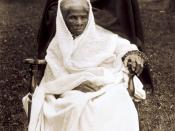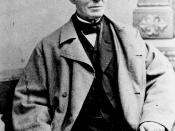During the three decades that preceded the Civil War abolitionism was a major factor in the demise of slavery. Abolitionism was a morally grounded and uncompromised movement during the 17th and 18th centuries. Abolitionist played a key role in setting the terms of debate over slavery and in making it a compelling moral issue. The 13th amendment was ratified in 1865 which abolished slavery. William Lloyd Garrison, and other white and black abolitionists played a significant role in leading to the demise of slavery. There have been many scholarly opinions of how the abolitionists had a role in the demise of slavery. Many abolitionists played a positive role in it, but some were persecuted for what they had to say and thought of as a negative source for the movement.
Stephen H. Browne critiques William Lloyd Garrison's Textual style and Radical Critique In William Lloyd Garrison's Thoughts On African Colonization.
Browne's essay was often very praiseful of Garrison and in many ways puts Garrison in regards that few people are ever held up to. Browne not only says that Garrison launched a phase in the anti-slavery -movement, but he continued on to even say that Garrison's Thought's "helped to effect a rhetorical revolution whereby one language of reform was to be vanquished and another set in place" (Browne 177). In Browne's essay he focuses on Garrison's fight against the American Colonization Society which was formed by Reverend Robert Finley. Finley was a believer that the best solution to the slavery issue was to send freed slaves back to Africa. He believed this to be a win-win situation in which America could both be freed of Blacks while maintaining a moral facade. Finley himself said, "We should be cleared of them, we should send to Africa a population...



Abolitionist's Role
Abolitionist's Role nice essay
0 out of 0 people found this comment useful.